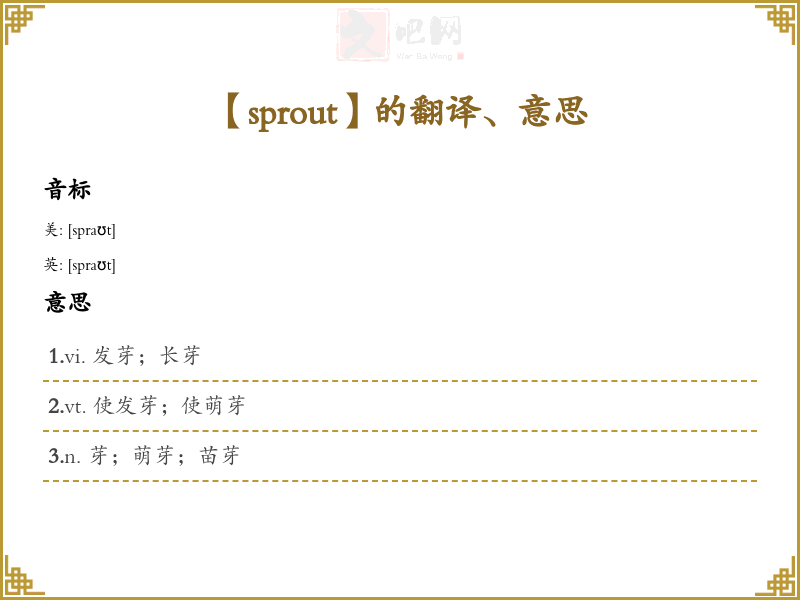【sprout】的翻译、意思
时间: 2025-03-06 17:45:37
【sprout】怎么读
美:[spraʊt]
英:[spraʊt]
【sprout】是什么意思、字义解释
1. vi. 发芽;长芽
2. vt. 使发芽;使萌芽
3. n. 芽;萌芽;苗芽
4. n. (Sprout)人名;(英)斯普劳特
【sprout】等级考试
TEM4 ( sprouting, sprouted, sprouts )
【sprout】的详细解释
英文单词学*与分析:[sprout]
1. 基本定义
- 字面意思:Sprout的字面含义是指植物从种子或土壤中生长出来的嫩芽或新的生长部分。它也可以引申为任何新生事物的出现。
- 词性:动词(verb)和名词(noun)。
2. 词源与起源
- 词源分析:Sprout源自古英语“sprūtan”,意为“生长”或“发芽”。它与德语“sprießen”(发芽)和荷兰语“spruiten”有关。词根“sprout”表明生长和新生的概念。
- 历史背景:该词首次出现在中世纪英语文献中,用于描述植物的生长过程。
课本
- 在*的英语教材中,"sprout"通常出现在小学或初中的英语学中,尤其是在讲解植物生长及自然现象的章节。
- 在牛津和美国的教材中,"sprout"可能出现在关于生态、科学或自然的章节,适合初中到高中的学生。
3. 使用场景
-
正式与非正式语境:
- 正式:在科学论文或生态研究中,"sprout"用来描述植物的生长阶段。例如:“The sprout of the plant indicates its healthy growth conditions.”(植物的芽表示其健康的生长条件。)
- 非正式:在日常对话中,可能用来比喻人的成长或新的想法的出现。例如:“I have a new idea sprouting in my mind.”(我脑海中萌生了一个新想法。)
-
特殊场合:
- 在法律领域,"sprout"可以用来描述新兴的法律或法规。例如:“The new regulations are just starting to sprout in the legal landscape.”(新的法规在法律环境中刚刚开始出现。)
- 在科学领域,"sprout"常用于植物生理学,描述植物的发芽过程。
4. 示例句子
-
The sprout broke through the soil, reaching for the sunlight.
(芽突破土壤,向阳光伸展。) -
New ideas often sprout from discussions with others.
(新的想法常常在与他人的讨论中萌发。) -
The gardener was excited to see the first sprouts of spring.
(园丁兴奋地看到春天的第一批嫩芽。) -
They decided to sprout beans in the classroom as a science project.
(他们决定在教室里发芽豆子作为科学项目。) -
The company's new initiative is just starting to sprout.
(公司的新倡议刚刚开始萌芽。)
5. 同义词与反义词
-
同义词:
- Germinate:强调种子开始发芽的过程。
- Bud:通常指植物的芽,强调生长的初步阶段。
- Shoot:指植物的嫩枝或新芽。
-
反义词:
- Wither:指植物枯萎或死亡,与"sprout"相反。
- Diminish:指某物的减少或消失,也与新生的概念相对立。
. 学方法
- 音标记忆法:将"sprout"的音标/spraʊt/分解为“spr” + “out”,想象一颗种子“喷出”嫩芽。
- 谐音联想记忆:可以将“sprout”联想到中文“喷发”,想象种子喷出嫩芽的画面。
7. 关联词汇
- Seed(种子)
- Growth(生长)
- Plant(植物)
- Garden(花园)
- Vegetable(蔬菜)
通过这些分析,可以更好地理解和运用单词“sprout”。
【sprout】例句
1、[V-I] When plants, vegetables, or seeds sprout, they produce new shoots or leaves. (植物、蔬菜、种子) 发芽
-
例:It only takes a few days for beans to sprout.豆子只需几天就会发芽。
2、[V-I] When leaves, shoots, or plants sprout somewhere, they grow there. (叶子、芽、植株) 长出
-
例:Leaf-shoots were beginning to sprout on the hawthorn.叶芽开始在山楂树上长出来。
3、[[no passive]] If something such as hair sprouts from a person or animal, or if they sprout it, it grows on them. (人、动物) 长出 (毛发等); (毛发等) 长出来
-
例:She is very old now, with little, round, wire-rimmed glasses and whiskers sprouting from her chin.她现在很老了,戴着小而圆的金属丝框眼镜,下巴长出了胡须。
